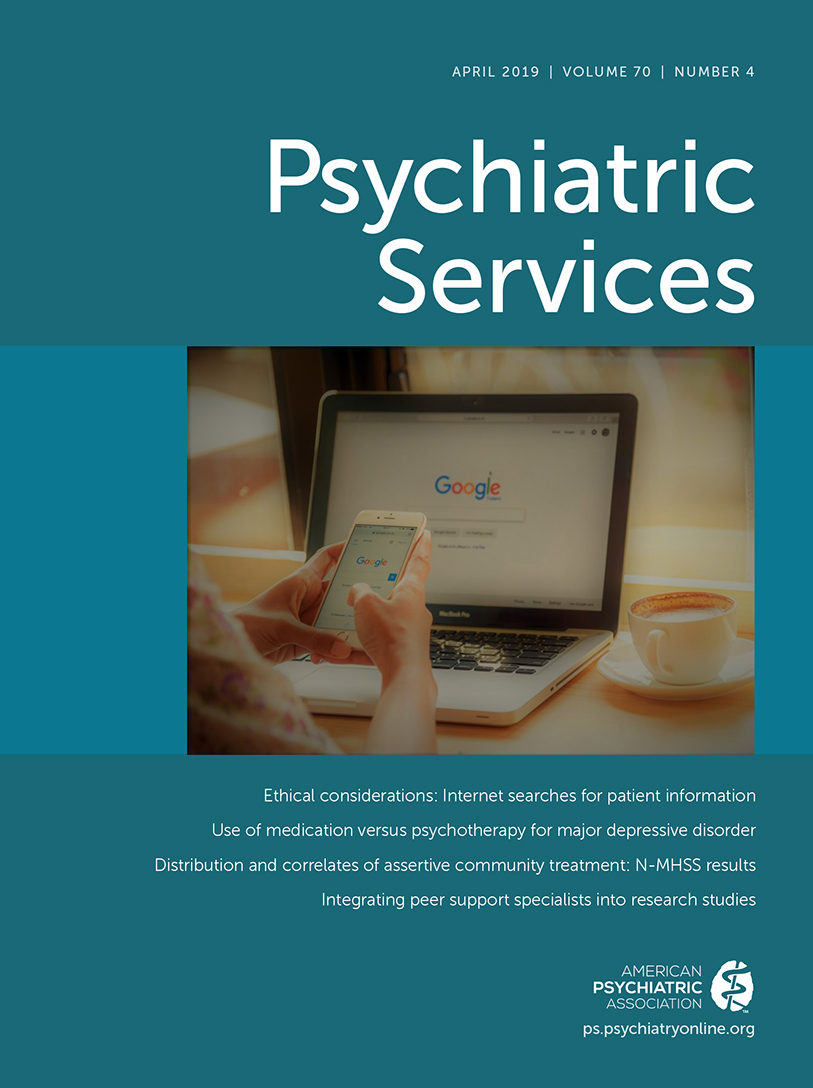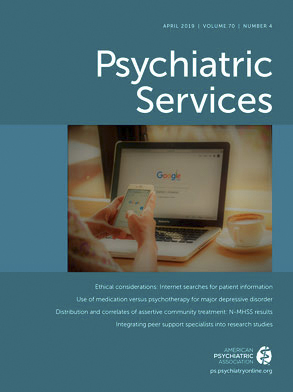The role of a peer support specialist involved in an evaluation or research project differs from typical peer support provided in clinical contexts. Research protocols may introduce specifications that uniquely govern the peer relationship. The authors recount their experiences adapting to this novel context for peer support and offer recommendations to peer support specialists and researchers who may be involved in peer-delivered interventions in a research setting.
—Jeffrey L. Geller, M.D., M.P.H.
Peer support specialists occupy various roles within mental health systems. As the peer support field expands, researchers are investigating the many ways that peers can assist those learning to cope with a psychiatric diagnosis. Thus, peer support specialists may increasingly provide support as part of an evaluation or research project. We are two certified peer support specialists and military veterans who recently worked as research peer support specialists for a study that investigated the effectiveness of a peer-supported, computerized cognitive-behavioral therapy (cCBT) intervention for veterans with depression. We describe the benefits and challenges of being peer supporters, in general, and the special circumstance of working on a research project. This column may be of particular interest to peer support specialists interested in pursuing work as research peer supporters and to researchers and supervisors who will be studying or supervising peer-delivered interventions. Our goal is that the experiences we share herein might guide others in successfully integrating peer supporters into future research studies.
Our complex role in the research intervention, which occurred from 2014 to 2018, was to assist veterans by telephone (or in person, if desired) for 12 weeks while they completed an eight-module online cCBT program called Beating the Blues (BtB). We consulted with participants weekly about their progress, to provide peer support, and to discuss the current module they were working on. We met weekly with a supervising clinical psychologist and had a monthly consultation call with two other research peer support specialists working on the study and a clinical psychologist who was not our direct supervisor.
Our responsibilities in the research study shared some similarities with peer support provided in typical clinical contexts. Our lived experience as veterans finding resiliency and our first-hand experience of completing BtB grounded the perspective we shared on how the modules could be helpful in participants’ lives. For example, one of us (R.H.B.) conveyed to participants how BtB helped her manage stresses in her own life and expressed hope that BtB would do the same for them. Modeling recovery authentically was important; we needed to demonstrate to the participants through our behavior the effort necessary in an ongoing healing process. R.H.B. also described to paricipants how visiting her trauma specialist at the veterans center and receiving acupuncture at the VA medical center was part of her self-care and personalized homework from BtB. This example demonstrated, pragmatically, that recovery is a process that requires ongoing work.
However, peer support in a research context differs from typical peer support in a few key ways. Principally, the research protocol specified that there was a 12-week limit on our time with each participant and that the main goal of our peer support was to help the participant complete BtB. These specifications felt incompatible with the tenets of peer support in clinical settings in several ways. First, we were accustomed to providing support in a less restrictive time frame, often over a period of months or years, which allowed veterans to take their time in accepting support and deciding how and when to receive it. In contrast, during the study, we felt pressure to quickly reach a point in the relationship where we could discuss how BtB might be useful for participants. As a result, rather than be guided by the veterans themselves, many of our conversations focused on identifying challenges to completing BtB. This restriction produced contrived or constrained experiences compared with the typical peer relationship.
Second, when participants did not complete BtB or wanted to continue to receive support after 12 weeks, the requirement to end our support felt conceptually like leaving a veteran behind. When participants desired, we referred them to other types of peer support services at the end of their 12 weeks in the study, but we still experienced an emotion akin to survivor’s guilt.
Another key difference from typical peer support was the predetermined goal that each participant complete the eight BtB modules. We found ourselves trying to balance the veterans’ needs with this goal. We felt pressure to impel the participants to complete the BtB modules and felt responsible for this outcome. Over the course of the study, G.R.B. learned to respond to the pressure by reminding himself that ultimately it was the participants’ goals that mattered, not our own or those of the study. This conclusion was difficult to accept, because having completed BtB, G.R.B. knew the program introduced tools that could help the participants. Over time, we came to appreciate that our accountability and responsibility as research peer support specialists were different from the participants’ accountability and responsibility to complete the modules. We had to guard ourselves against owning the outcome and feeling guilty if a participant did not complete BtB.
Finally, the research protocol required that we have specific scripted interactions with participants regarding suicide at each visit. Our crisis protocol training taught us to ask direct questions. We learned the value of explicitly asking the question, “Are you thinking about hurting yourself or someone else?” in the same matter-of-fact tone as “How are you doing today?”—without judgment, without alarm, and with genuine concern. We liked this part of the study because it kept us cognizant of potential changes in suicide risk. Our training included practice responding to potential crisis situations over the phone, including using three-way calling so that we knew how to connect participants to the Veterans Crisis Line.
Ongoing training, consultation, and supervision created the conditions for us to support ourselves, the study, and the participants. In addition to our initial training, we attended a two-day advanced training in motivational interviewing. Although we were not delivering a motivational interviewing intervention per se as part of the study, we learned foundational motivational interviewing skills (e.g., open-ended questions) and found them to be helpful. We tailored some of the basic motivational interviewing questions to fit our study, and we practiced with each other through role-plays.
Our peer-to-peer consultation was a major factor in helping us support each other as we improved our skill sets to reach the goals of the study and to address personal challenges as research peer support specialists. From the first monthly call through the end of the four-year project, we respected each other’s opinions and views on how to work with participants, which created a safe place for us to discuss difficult situations, concerns, and challenges. G.R.B. especially valued that we alternated which peer support research assistant planned the agenda for and facilitated our monthly peer-to-peer calls. This rotation allowed us to hear one another’s perspectives and draw on each other’s knowledge. Our experiences on these calls leads us to strongly recommend that future research studies involving research peer support specialists include opportunities for ongoing peer-to-peer collaboration.
Mutually respectful, supportive, and nonjudgmental clinical supervision was a critical part of the project. Consistent clinical supervision helped us process intense interactions with participants. For example, one participant with whom R.H.B. worked expressed suicidal ideation over the phone. The caller said that he appreciated someone listening to him without making him feel stupid or weak and that he felt better having talked about feeling suicidal. After the call, R.H.B. immediately contacted her supervisor, who thoughtfully evaluated the work done and validated R.H.B.’s response to the participant. Collaboratively, R.H.B. and her supervisor decided to focus their one-on-one supervision discussions on this particular veteran until he reestablished a sense of well-being and resiliency. The supervisor’s response gave R.H.B. a sense of relief in a stressful and unfamiliar situation. The appreciation the supervisor expressed and her respect for R.H.B. and for her work as a peer support specialist were motivating. We offer this as an example of supervision that is guiding without being authoritarian. We believe that this type of guiding supervision is an indispensable component of future studies of peer support.
In conclusion, the factors we identified as critical for our success as research peer support specialists included multiple layers of training and professional development, empathy for research participants, collaboration, flexibility, strong work ethic, stabilizing self-care, and intrinsic motivation to continue learning. We also believe it imperative that research peer support specialists (and others involved) believe in the interventions being delivered and conform to the protocols of the study. Peer specialists who are considering involvement in research must understand that the activities undertaken as part of a study are designed to serve the study itself. From our experience, our sense is that successful research peer support specialists are able to effectively communicate to different audiences (e.g., clinicians, participants, research staff) in the languages they speak, recognize and manage ambiguity, and remain flexible with their time, ideas, and approaches with participants. We also recommend that research peer support specialists read, comprehend, and apply the background information on the study so they can fully carry out the study protocols. Ultimately, this reflection is designed to advance research on peer-based interventions to positively influence the practices and policies that promote well-being. It is our hope that readers will use our experiences as an informative guide to incorporating peer support specialists into research studies.
Acknowledgments
Jeffrey L. Geller, M.D., M.P.H., is editor of this column.
During this study, Ms. Hendrix-Brown and Mr. Bourdeau worked with the Veterans Affairs (VA) Center for Clinical Management Research in Ann Arbor, MI, and were supported by VA Health Services Research and Development Service grant IIR-13-310. The authors thank principal investigators Paul Pfeiffer, M.D., M.S., and Marcia Valenstein, M.D., M.S., project coordinator Lauren Emerson, M.S.W., and CONNECT staff. Special thanks to Kristen Abraham, M.A., Ph.D., and Winnetha Benn-Burton, M.A., Ph.D., for guidance during the writing of this column.

